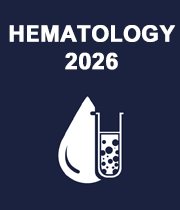Transplantation Biology and New Therapeutic Avenues
A bone marrow transplant is a treatment that replaces the damaged or diseased bone marrow with healthy blood-forming stem cells. A stem cell transplant is another name for a bone marrow transplant. For patients with hematologic malignancies, hematopoietic cell transplantation (HCT) is a life-prolonging or potentially curative therapy option. These therapeutic techniques were initially limited to younger patients due to the significant transplant-related morbidity, but they are increasingly being employed in older adults. The incidence of most hematologic malignancies rises with age, and as the population ages, so does the number of prospective older HCT candidates. Allogeneic haemopoietic stem cell transplantation (HSCT) is used to treat a limited number of individuals with a variety of malignant and non-malignant blood illnesses, as well as other immune system problems.



Title : Acute intermittent porphyria: A neurological dilemma obscured by ubiquitous fgastrointestinal presentation
Mayank Anand Singh, Mimer Medical College, India
Title : Comprehensive symptom management and supportive nursing care in a preterm toddler undergoing HSCT for pyruvate kinase deficiency
Tran Thi Dung, Vinmec International Hospital, Vietnam